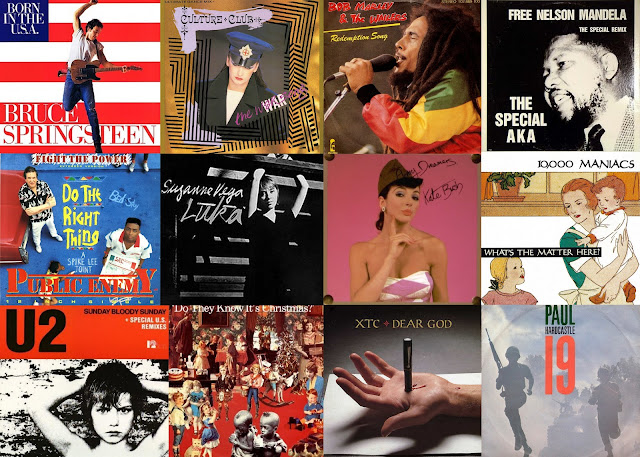Close Read
Sometimes, it's not until a piece of art is examined in fine detail that new meanings arise. When cultural context, the artist's intentions, or even your own prior knowledge are set aside a new way of "seeing" the art can emerge. This is the purpose of a close reading, sometimes called an explication.
For this essay, you will conduct a close reading of a socially-conscious song from the 1980s. Though eighties music is often dismissed as silly and inauthentic, the decade can lay claim to a surprisingly substantial amount of socially-conscious music. In reality, it likely produced more politically-charged songs than any decade, except the sixties. Everything from child abuse to nuclear war to African famines received musical attention from some of the biggest stars of the decade.
Your goal is to delve deeply into a song in hopes of uncovering new ways to understand it. You will have wide latitude in how you choose to engage it. However, your focus should be concise, minute details. For example, instead of examining the Mona Lisa as a whole, in a close read, you'd consider only the hands. As always, ground your analysis in a strong thesis, supported by evidence from the song only—no outside research.
Choose only one of the following songs for your analysis:
- Bob Marley & The Wailers, "Redemption Song" (1980; about social awareness]
- Dead Kennedys, "Holiday in Cambodia" (1980; anti-American imperialism)
- Kate Bush, "Army Dreamers" (1980; anti-war)
- Pat Benatar, "Hell is for Children" (1980; anti-child abuse)
- Peter Gabriel, "Biko" (1980; anti-apartheid)
- Grandmaster Flash and The Furious Five, "The Message" (1982; about racial inequity and poverty)
- Billy Joel, "Allentown" (1982; about blue-collar worker displacement)
- Grandmaster Flash & Melle Mel, "White Lines (Don't Do It)" (1983; anti-drug)
- Peter Schilling, "(Let's Play) USA" (1983; about declining American values)
- U2, "Sunday Bloody Sunday" (1983; about the Northern Ireland conflict)
- The Specials, "Nelson Mandela" (1984, anti-apartheid)
- Frankie Goes to Hollywood, "Two Tribes" (1984; anti-nuclear war)
- Bruce Springsteen, "Born in the USA" (1984; about veteran rights)
- Nena, "99 Luftballoons" (1984; anti-nuclear war)
- Culture Club, "The War Song" (1984; anti-war)
- Band Aid, "Do They Know It's Christmas?" (1984; charity single for African famine relief)
- USA for Africa, "We are the World" (1984; charity single for African famine relief)
- U2, "Bad" (1984; about heroine addiction)
- Sting, "Russians" (1985; anti-Cold War)
- Don Henley, "All She Wants to Do is Dance" (1985; about Americans' ambivalence about US military operations around the world)
- Northern Lights, "Tears Are Not Enough" (1985; charity single for African famine relief)
- Artists United Against Apartheid, "Sun City" (1985; anti-apartheid)
- Paul Hardcastle, "19" (1985; anti-war)
- Dionne Warwick, Elton John, Gladys Knight, and Stevie Wonder, "That's What Friends are For" (1985; charity single for AIDS research and prevention)
- Suzanne Vega, "Luka" (1987; child abuse)
- Prince, "Sign o' the Times" (1987; societal problems)
- Bruce Hornsby and The Range, "The Way It Is" (1986; about economic inequality)
- Metallica, "Master of Puppets" (1986; about drug addiction)
- XTC, "Dear God" (1986; anti-organized religion)
- Midnight Oil, "Beds are Burning" (1987; pro-Australian Aboriginal rights)
- 10,000 Maniacs, "What's the Matter Here" (1987; about child abuse awareness)
- REM, "Orange Crush" (1988; anti-war)
- NWA, "Fuck tha Police" (1988; about police brutality)
- Tracy Chapman, "Talkin' 'Bout a Revolution" (1988; about social justice)
- Boogie Down Productions, "Sop the Violence" (1988; about the increasing violence in Hip Hop)
- 10,000 Maniacs, "Poisoning the Well" (1989; pro-environmental)
- Phil Collins, "Another Day in Paradise" (1989; about the homeless epidemic)
- Public Enemy, "Fight the Power" (1989; about racial injustice)
- The B-52's, "Channel Z" (1989; anti-mass media)
- Billy Joel, "We Didn't Start the Fire" (1989; about the the overwhelming number of issues facing America)
Notes:
- Refer to the "protagonist" of a song as the "speaker."
- When citing a song in-text, cite the artist—example: The brash, young singer reminded 1980s listeners that "You know that we are living in a material world" (Madonna).
- Use a "/" to separate lines in a song's lyrics—example: In the song, Mellencamp extols American individualism: "Ah, but ain't that America for you and me? / Ain't that America? Somethin' to see, baby / Ain't that America? Home of the free, yeah / Little pink houses for you and me."
- You are encouraged to look up your song's lyrics. However, Internet lyrics are notoriously unreliable, so it would be wise to check multiple sources.
- The groupings or divisions of lyrics in a song is refereed to as a "verse"--as opposed to a "stanza" in poetry
Requirements:
- MLA Style (including works cited)
- Approx. 500-750 words

Comments
Post a Comment